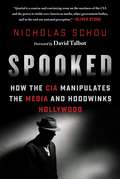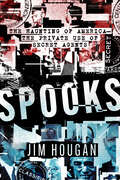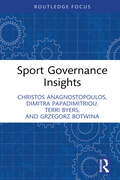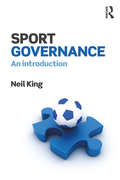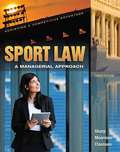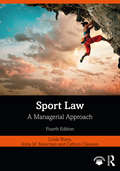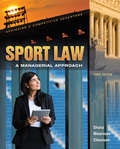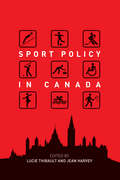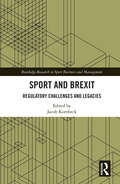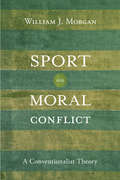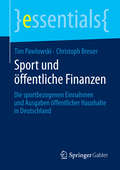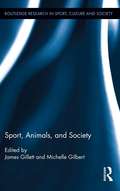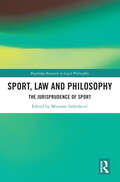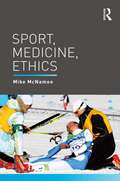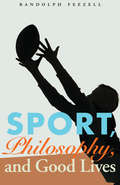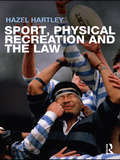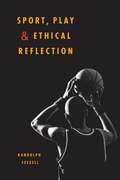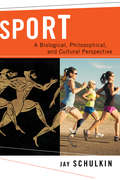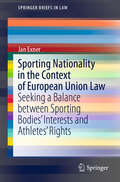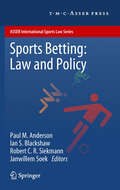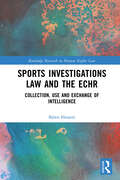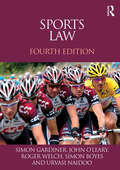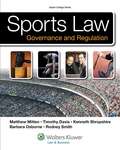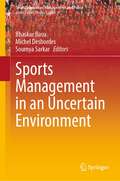- Table View
- List View
Spooked: How the CIA Manipulates the Media and Hoodwinks Hollywood
by David Talbot Nicholas SchouA searing indictment of our time and “a concise and convincing essay on the nastiness of the CIA and the power it wields over American media” (Oliver Stone, Academy Award–winning screenwriter and director). The American people depend on a free press to keep a close and impartial watch on the national security operations that are carried out in our name. But as many are discovering, this trust is sadly misplaced as leading journalists are seduced and manipulated by the very secretive agencies they are supposed to be covering. Spooked exposes the sinister truth about our nation’s media, it’s corrupt relationship with the government, and those who control both entities. It reveals a truth that many have tried to bring to light, only to be dismissed as conspiracy theorists or paranoid extremists. Here, Nicholas Schou names those who have colluded to deceive the citizens of America. He shines a spotlight on flagrant examples of how respected reporters have sold out to the powerful agencies that control what you see, what you hear, and what you are supposed to believe.
Spooks: The Haunting of America—The Private Use of Secret Agents
by Jim Hougan&“Probably the most eye-opening and engrossing exposé to date of the bizarre &‘power games&’ played by multinational corporations and tycoons.&” —Publishers Weekly A classic of investigative reporting, Spooks is a treasure trove of who-shot-who research on the metastasis of the US intelligence community, whose practices and personnel have engulfed the larger society. Teeming with tales of wiremen, hitmen, and mobsters; crooked politicians and corrupt cops going about their business of regime-change, union-busting, wiretapping, money laundering, and industrial espionage, read about: • Richard Nixon&’s &“Mission Impossible&” war on Aristotle Onassis • Not-so-deep-fake porno films starring the CIA&’s enemies • The Robert Vesco heist, targeting billions in numbered Swiss accounts • Robert Maheu and the kidnapping of billionaire Howard Hughes • The murder-for-hire of a Columbia University professor • Bobby Kennedy&’s archipelago of private intelligence agencies—Intertel and the &“Five I&’s&” • &“The Friendly Ghost&” and Nixon&’s secret account in the offshore Castle Bank & Trust &“One of the best non-fiction books of the year, a monument of fourth-level research and fact-searching.&” —Los Angeles Times&“This book will curl your hair with its revelations and the names it names. A landmark book in its field of investigative reporting.&” —John Barkham Reviews &“Hougan is a superb storyteller and the pages teem with unforgettable characters. Admirable.&” —The Washington Post &“Hougan is exhilarating on the mystique of spooks.&” —The New York Review of Book
Sport Governance Insights (Sport Business Insights)
by Terri Byers Christos Anagnostopoulos Dimitra Papadimitriou Grzegorz BotwinaThis book introduces the fundamentals of sport governance, assuming no prior knowledge on the part of the reader. It explains to students and practitioners alike why governance matters and how it can be better practiced in sport organizations. Introducing key concepts and the micro-processes of implementation, the book explains what governance is and why it has become increasingly important. It explains what sport boards do, and how they should function for sport organizations to be effective, and it provides practical tools to help ensure good governance. Full of insights from cutting-edge research and real-world cases, this is essential reading for any student or practicing sport manager, administrator, or policy-maker who needs a concise introduction to this important topic.
Sport Governance: An introduction
by Neil KingSport governance has become an increasingly widespread subject for research and teaching in sports studies. This engaging and accessible textbook examines the governance of sport organisations in a changing political, legal, financial and socio-cultural context. It explains how sport organisations are governed, explores the issues and challenges faced by those governing sport today, and looks ahead to how sport can be governed better in the future. Covering sport at all levels, from community organisations and national governing bodies to international organisations such as the IOC and FIFA, this text examines key components of governance, such as legal and regulatory frameworks, stakeholding, performance, compliance and the reform of the non-profit sector in line with corporate governance. This text is also timely given that recent corruption scandals in sport have served to highlight the central importance of good governance in sport. Its nine chapters draw upon more than thirty international case examples across a range of sports including athletics, football, gymnastics, hockey, rowing, rugby, badminton and tennis. With extensive lists of learning activities and resources, original empirical research and insights into the politics of policymaking and implementation, this textbook is essential reading for any course on sport governance, policy, management or development.
Sport Law: A Managerial Approach
by Linda A. Sharp Anita M. Moorman Cathryn L. ClaussenSport Law: A Managerial Approach, third edition, merges law and sport management in a way that is accessible and straightforward. Its organization continues to revolve around management functions rather than legal theory. Concise explanations, coupled with relevant industry examples and cases, give readers just enough legal doctrine to understand the important concepts that apply to each area. This book will help prepare students as they get ready to assume a broad range of responsibilities in sport, education, or recreation.
Sport Law: A Managerial Approach
by Anita M. Moorman Cathryn Claussen Linda SharpNow in its fourth edition, this text is still the only sport law textbook to introduce sport legal studies from a management perspective and integrate legal strategies to gain a competitive advantage in business. Acknowledging that students understand legal concepts better when they are tied to real sport management practice, the book is organized around the core management functions. It provides concise explanations of key concepts, as well as current industry examples and legal cases, and gives the student all the legal knowledge they need to become confident and effective professionals in sport management, recreation, or sport education. This new edition includes additional contributions from leading sport law educators and practitioners, and has expanded coverage of important contemporary issues including: · Sports injury and concussion litigation· Impact of Covid-19 on events and leagues· Gender discrimination, disability discrimination, sexual harassment, #metoo, and USWNT pay equity· Intellectual property, licensing agreements, publicity rights, social media influencers, and digital privacy· Student-athletes and marketing rights· Sport gambling and state regulation· Athlete activism, employee free speech, and collective bargaining· Olympic and Paralympic restructuring· NCAA Division 1 Coaches Contracts The book contains useful features and ancillaries to help with teaching and learning, including managerial context tables, case opinions, focus cases, strategies for competitive advantage, discussion questions, and learning activities. It is an essential text for any course on sport law or recreation law, an invaluable supplement to any course on sport business and management, and an important reference for all sport management practitioners. Online resources include a variety of exam questions for each chapter, featuring multiple choice, true or false, short answer exam questions and short essay questions, and a sample syllabus.
Sport Law: A Managerial Approach
by Anita Moorman Cathryn Claussen Linda SharpSport Law: A Managerial Approach, third edition, merges law and sport management in a way that is accessible and straightforward. Its organization continues to revolve around management functions rather than legal theory. Concise explanations, coupled with relevant industry examples and cases, give readers just enough legal doctrine to understand the important concepts that apply to each area. This book will help prepare students as they get ready to assume a broad range of responsibilities in sport, education, or recreation. Whether readers work as coaches or teachers; administer professional programs; manage fitness/health clubs; or assume roles in a high school, college, Olympic, or professional sport organization, legal concerns will inevitably be woven into their managerial concerns. This book provides knowledge of the law that helps create a competitive advantage and build a more efficient and successful operation that better serves the needs of its constituents. New to the Third Edition New/expanded discussions and analysis of current and relevant legal issues. For example, the use of unpaid interns and unpaid volunteers; Bountygate, organizational liability for violent acts of players, and the power of the NFL commissioner; parody and social media; FTC guidelines for endorsers New case opinions. For example, Bouchat v. Baltimore Ravens; Glatt v. Fox Searchlight Pictures New focus cases. For example, Hart v. Electronic Arts, Inc., Hamill v. Cheley Colorado Camps, Inc., Geczi v. Lifetime Fitness, Limones v. School Dist. of Lee County; Woodman v. Kera LLC New competitive advantage strategies. For example, construction safety; ticket sales; worker’s compensation and student-athletes Discussion of the legal issues revolving around social media use. For example, Mendenhall v. Hanesbrands and the use of Twitter by professional athletes; IOC guidelines regarding the use of social media by athletes and journalists; social media policies at the high school and collegiate levels Real-world applications. The book is intended for future sport managers, and topics are clearly related to specific roles and functions; relevant and timely examples throughout help generate enthusiasm and lively class discussions. Continued focus on both sport participation and recreation. Sport managers in a variety of organizations can use the legal issues discussed throughout. Reader-friendly tone. Legal theories are clearly explained in student-friendly language. Special Features of the Book Managerial context tables. Chapter-opening exhibits act as organizational and study tools identifying managerial contexts in relation to major legal issues, relevant law, and illustrative cases for the chapter. Case opinions, focus cases, and hypothetical cases. Legal opinions--both excerpted (case opinions) and summarized (focus cases)--illustrate relevant legal points and help readers understand the interplay between fact and legal theory. The cases include questions for discussion, and the instructor’s manual provides guidance for the discussion. Hypothetical cases further highlight topics of interest and include discussion questions to facilitate understanding of the material; analysis and possible responses appear at the end of the chapter. Competitive advantage strategies. Highlighted, focused strategies based on discussions in the text help readers understand how to use the law to make sound operational decisions and will assist them in working effectively with legal counsel. Discussion questions, learning activities, and case studies. Thoughtful and thought-provoking questions and activities emphasize important concepts;they help instructors teach and readers review the material. Creative case studies stimulate readers, as future sport or recreation managers, to analyze situations involving a legal issue presented in the chapter. Annotated websites. Each chapter includes a collection of web resources to help readers explore topics further. Accompanying the web addresses are brief descriptions pointing out key links and the sites'...
Sport Policy in Canada (Open Access)
by Lucie Thibault and Jean HarveySport Policy in Canada provides the first and most comprehensive analysis of the new Canadian Sport Policy adopted in 2012. In light of this new policy, the authors, top scholars in the field, provide detailed accounts of the most salient sport policies and programs, while also discussing issues and challenges facing policy makers. In Canada and around the world, the last decades have known a sharp increase in state intervention and public funding in pursuit of medals on the international stage and in support of a more active lifestyle. Governments at all levels have made substantial investments in hope of hosting major sporting events to benefit from the economic impact and gain international prestige.The study of sport policies, often neglected in the past, is becoming an increasingly important research topic. Sport Policy in Canada seeks to fill this void by offering the most comprehensive analysis of sport policy since Macintosh, Bedecki, and Franks' Sport Policy in Canada (1987). - This book is published in English.
Sport and Brexit: Regulatory Challenges and Legacies (Routledge Research in Sport Business and Management)
by Jacob KornbeckThis is the first book to investigate the significance of Brexit for sport, with a particular focus on the regulatory and legal challenges that it poses, and the economic and political stresses that are likely to follow in its wake. Written by a team of leading researchers working across sport studies, legal studies and political science, and edited by an EU official with nearly two decades of experience working in EU sport policy, the book explains why regulation, and European dis-integration, matter to sport. It examines key topics including free movement, State aid and labour law, and considers the interests of key stakeholders from fans to football clubs to governing bodies. This is an essential reference for any advanced student, researcher, policy maker, administrator or industry professional working in sport, international law, political science, or international business and management.
Sport and Moral Conflict: A Conventionalist Theory
by William J. MorganWhat is the purpose of sport, and how are ethical conceptions of sport shaped by the answers to this question? In Sport and Moral Conflict, William Morgan investigates, examining sport as a moral crucible that puts athletes in competitive, emotionally charged situations where fairness and equality are contested alongside accomplishment. Morgan looks at the modern Olympics—from 1906 Athens to 1924 Paris, when the Games reached international prestige — in order to highlight the debate about athletic excellence and the amateur-professional divide. Whereas the Americans emphasized winning, the Europeans valued a love of the game. Morgan argues that the existing moral theories of sport—formalism and broad internalism (aka interpretivism), which rely on rules and general principles—fall short when confronted with such a dispute as the transition from amateur to professional sport. As such, he develops a theory of conventionalism, in which the norms at work in athletic communities determine how players should ethically acquit themselves. Presenting his case for an ethical theory of sport, Morgan provides insights regarding the moral controversies and crises that persist today.
Sport in Kultur und Gesellschaft: Handbuch Sport und Sportwissenschaft
by Michael Krüger Dieter Hackfort Eike Emrich Freya Gassmann Christian PierdziochDieses Handbuch bietet einen kompletten Überblick über die zentralen Themen der Sozialwissenschaften im Sport. Es richtet sich an das breite Publikum der Fachleute, Lehrenden und Wissenschaftler*innen in Sport und Sportwissenschaft. Hier können Sie sich kompakt und kompetent über den Stand der Wissenschaft zur Kultur des Sports informieren. Das Handbuch ersetzt bisherige Lexika und Handbücher zum Sport. Die Texte sind verständlich formuliert und anschaulich aufbereitet. Die knapp 50 Kapitel in diesem Band geben Ihnen den aktuellsten wissenschaftlichen Stand über die ökonomischen, sozialen, kulturellen, politischen, rechtlichen, pädagogischen und psychologischen Zusammenhänge des Sports. Zudem erhalten Sie Hinweise auf die wichtigste nationale und internationale Forschungsliteratur. Die Herausgeber: Arne Güllich ist Professor für Sportwissenschaft und leitet das Fachgebiet Sportwissenschaft an der TU Kaiserslautern. Er forscht in den Bereichen Jugendsport, Talententwicklung, Training und Förderstrukturen. Güllich hat zuvor im Deutschen Olympischen Sportbund als Leiter der Stabsstelle Grundsatzfragen gearbeitet. Praxiserfahrungen hat er als Trainer vom Jugendbereich bis zu den Olympischen Spielen gesammelt. Michael Krüger ist Professor für Sportwissenschaft an der Westfälischen Wilhelms-Universität zu Münster. Seine Forschungsschwerpunkte liegen im Bereich der Sportpädagogik und -geschichte, der wissenschaftstheoretischen Grundlagen der Sportwissenschaft, der olympischen Geschichte und Erziehung sowie von ethischen und pädagogischen Fragen des Sports. Er ist Verfasser und Herausgeber zahlreicher wissenschaftlicher Arbeiten zum Sport sowie mehrerer Lehr- und Handbücher zur Sportwissenschaft und Sportpädagogik.
Sport und öffentliche Finanzen: Die sportbezogenen Einnahmen und Ausgaben öffentlicher Haushalte in Deutschland (essentials)
by Tim Pawlowski Christoph BreuerDem Sport werden zahlreiche Gemeinwohlfunktionen zugeschrieben. Aus diesem Grund wird er mit öffentlichen Mitteln gefördert. In welchem Umfang der Sport in Deutschland auf diese Weise gefördert wird und insbesondere welche Mittel aus dem Sport wieder an die öffentlichen Haushalte zurückfließen, war bislang unklar. Auf Basis einer Vielzahl von Datenquellen werden in diesem Beitrag die sportbezogenen direkten Einnahmen und Ausgaben der öffentlichen Haushalte systematisch abgeschätzt. So ergibt sich - je nach Abgrenzung des Sportsektors - ein differenziertes Bild der finanzpolitischen Bedeutung des Sports in Deutschland.
Sport, Animals, and Society (Routledge Research in Sport, Culture and Society #31)
by James Gillett Michelle GilbertThis book advances current literature on the role and place of animals in sport and society. It explores different forms of sporting spaces, examines how figures of animals have been used to racialize the human athlete, and encourages the reader to think critically about animal ethics, animals in space, time and place, and the human-animal relationship. The chapters highlight persistent dichotomies in the use of and collaboration with animals for sport, and present strategies for moving forward in the study of interspecies relations.
Sport, Law and Philosophy: The Jurisprudence of Sport (Routledge Research in Legal Philosophy)
by Miroslav ImbriševićSport, Law and Philosophy: The Jurisprudence of Sport discusses the intersection of law and sport and highlights its usefulness to both legal scholars and philosophers of sport. There is a general recognition that law and sports bear strong similarities. Both can be understood as systems of rules, with a judge/referee who has the power to adjudicate and to issue punishments/penalties. Divided into two parts, this volume presents an exploration of central philosophical issues arising from the intersections of law and sport and makes reference to current events and controversies. Experts from across the globe discuss a range of issues such as sports as legal systems, the game as a social contract, the role of the referee, including VAR, rule breaking, equality in women’s sport, justice on the sports field and in the court room, and issues surrounding the application of law to sports. The book will be a valuable resource to Undergraduates, Postgraduates and for those working in the areas of legal philosophy, sports law, and philosophy of sport.
Sport, Medicine, Ethics
by Mike McNameeThe ethics of sports medicine is an important emerging area within biomedical ethics. The professionalization of medical support services in sport and continuing debates around issues such as performance-enhancing technologies or the health and welfare of athletes mean that all practitioners in sport, as well as researchers with an interest in sports ethics, need to develop a clear understanding of the ethical aspects of the sport–medicine nexus. This timely collection of articles explores the conceptual and practical issues that shape and define ethics in sports medicine. Examining central topics such as consent, confidentiality, pain, doping and genetic technology, this book establishes an important baseline for future academic and professional work in this area.
Sport, Philosophy, and Good Lives
by Randolph FeezellThere&’s more to sports than the ethos of competition, entertainment, and commercialism expressed in popular media and discourse. Sport, Philosophy, and Good Lives discusses sport in the context of several traditional philosophical questions, including: What is a good human life and how does sport factor into it? To whom do we look for ethical guidance? What makes human activities or projects meaningful? Randolph Feezell examines these questions along with other relevant topics in the philosophy of sport such as the contribution of play to a meaningful life, the various reasons for pessimistic views of sport, the various claims that celebrated athletes are role models, and the seldom-questioned view that coaches are in a position to offer advice to athletes on how to live or on leadership skills. He also discusses the way that non-Western attitudes found in Buddhism, Taoism, and the Bhagavad Gita might be used to address the vulnerabilities of sports participants.Feezell draws from current sports issues, popular literature, and contemporary sports figures to shed light on the attraction and value of sports and examine the accompanying ethical issues.
Sport, Physical Recreation and the Law
by Hazel HartleyIt is important for anybody involved in sport and physical recreation to be aware of the legal context in which their activity takes place, to develop an understanding of their legal responsibilities and to know what might happen if something goes wrong. Sport, Physical Recreation and the Law is the first textbook on this difficult subject for students and practitioners in sport and physical recreation. Covering a wide range of legal principles and cases, this textbook introduces the reader to legal systems, terminology, databases and the use of case law. Designed to encourage analysis, reflection and the application of examples and ideas from the reader’s own experience, the book clearly and comprehensively explains key topics such as: socio-legal aspects of sports violence and criminal liability negligence and defences against negligence manslaughter by individuals and organizations in sport principles of natural justice, disciplinary tribunals and doping discrimination, harassment and child protection risk management, statutory duties, and breaches of health and safety criminal liability – recognized sports, hazing, and cage fighting. Including over 300 exercises, hypothetical scenarios, investigative tasks and seminar activities, this book is an essential course text for all students of sport, recreation and the law, and an invaluable reference for coaches, physical education teachers and those who play, lead or organize sport and physical recreation.
Sport, Play, and Ethical Reflection
by Randolph FeezellIn paperback for the first time, Randolph Feezell's Sport, Play, and Ethical Reflection immediately tackles two big questions about sport: "What is it?" and "Why does it attract so many people?" Feezell argues that sports participation is best described as a form of human play, and the attraction for participants and viewers alike derives from both its aesthetic richness and narrative structure. He then claims that the way in which sports encourage serious competition in trivial pursuits is fundamentally absurd, and therefore participation requires a state of irony in the participants, where seriousness and playfulness are combined. Feezell builds on these conclusions, addressing important ethical issues, arguing that sportsmanship should be seen as a kind of Aristotelian mean between the extremes of over- and under-investment in sport. Chapters on cheating, running up the score, and character building stress sport as a rule-governed, tradition-bound practice with standards of excellence and goods internal to the practice. With clear writing and numerous illuminating examples, Feezell demonstrates deep insight into both of his subjects.
Sport: A Biological, Philosophical, and Cultural Perspective
by Jay SchulkinSports are as varied as the people who play them. We run, jump, and swim. We kick, hit, and shoot balls. We ride sleds in the snow and surf in the sea. From the Olympians of ancient Greece to today's professional athletes, from adult pickup soccer games to children's gymnastics classes, people at all levels of ability at all times and in all places have engaged in sport. What drives this phenomenon?In Sport, the neuroscientist Jay Schulkin argues that biology and culture do more than coexist when we play sports—they blend together seamlessly, propelling each other toward greater physical and intellectual achievement. To support this claim, Schulkin discusses history, literature, and art—and engages philosophical inquiry and recent behavioral research. He connects sport's basic neural requirements, including spatial and temporal awareness, inference, memory, agency, direction, competitive spirit, and endurance, to the demands of other human activities. He affirms sport's natural role as a creative evolutionary catalyst, turning the external play of sports inward and bringing insight to the diversion that defines our species. Sport, we learn, is a fundamental part of human life.
Sporting Nationality in the Context of European Union Law: Seeking a Balance between Sporting Bodies’ Interests and Athletes’ Rights (SpringerBriefs in Law)
by Jan ExnerThis book strikes a balance between international sporting governing bodies’ interests and values enshrined in rules regarding sporting nationality on one hand, and athletes’ rights under EU law on the other. It argues that some rules governing athletes’ eligibility in national teams in their current form, notably certain waiting periods, quotas for naturalised athletes or athletes having previously played for another country, and rules prohibiting the change of sporting nationality, constitute a disproportionate restriction on athletes’ rights under EU citizenship, free movement of persons, competition law or fundamental rights. Accordingly, the book subsequently presents concrete recommendations for international sporting governing bodies on how to reconcile their interests and values with the rights that athletes enjoy under EU law. As such, it offers an essential guide for these bodies and their representatives, as well as for athletes, academics and practitioners in the fields of law and sports.
Sports Betting: Law and Policy
by Robert C.R. Siekmann Ian S. Blackshaw Janwillem Soek Paul M. AndersonGambling is a significant global industry, which is worth around 0.6% of world trade, that is, around US$ 384 billion; and gambling on the outcome of sports events is a very popular pastime for millions of people around the world, who combine a bet with watching and enjoying their favourite sports. But, like any other human activity, sports betting is open to corruption and improper influence from unscrupulous sports persons, bookmakers and others. Sports betting in the last ten years or so has developed and changed quite fundamentally with the advent of modern technology - not least the omnipresence of the Internet and the rise of on-line sports betting. This book covers the law and policy on sports betting in more than forty countries around the world whose economic and social development, history and culture are quite different. Several chapters deal with the United States of America. This book also includes a review of sports betting under European Union (EU) Law. The book appears in the ASSER International Sports Law Series, under the editorship of Dr. Robert Siekmann, Dr. Janwillem Soek and Marco van der Harst LL.M.
Sports Investigations Law and the ECHR: Collection, Use and Exchange of Intelligence (Routledge Research in Human Rights Law)
by Björn HessertThis book focuses on the analysis of coercive measures that sports organisations are permitted to use as part of their internal sports investigation proceedings to investigate sports rule violations. The legality of such coercive measures is measured against the legal regime of the European Convention on Human Rights (ECHR). The book examines the important issue of the applicability of the ECHR to private sports organisations, which is currently widely debated in the field of sports law. The ECHR is hereby used as the analytical framework, which should also be a source of inspiration for jurisdictions outside the scope of application of the ECHR. The book further explores if and to what extent sports organisations and law enforcement agencies may exchange intelligence in support of both internal sports investigation proceedings and criminal investigations. At all stages, the work seeks to strike a balance between the interest of sports organisations to investigate sports rule violations and the rights of athletes and other sportspersons. The work will be an invaluable resource for students, academics and policy-makers working in the area of Sports Law and Human Rights Law.
Sports Law
by John O'Leary Simon Gardiner Roger Welch Simon Boyes Urvasi NaidooLong established as the market leading textbook on sports law, this much-anticipated new edition offers a comprehensive and authoritative examination of the legal issues surrounding and governing sport internationally. Locating the legal regulation of sport within an explicit socio-economic context, this refocused edition is divided into four core parts: Governance & Sport; Commercial Regulation; Sports Workplace; and Safety in Sport. Recent developments covered in this edition include: EU competition law interaction with sport under arts. 101 and 102 of the Treaty on the Functioning of the European Union; the current World Anti-Doping Agency code; analysis of the recent Court of Arbitration for Sport Jurisprudence; reforms of the transfer system in team sports; anti-discrimination provisions in sport; engagement with match fixing; a focus on the legal context of 2012 London Olympics. Essential reading for students studying sports law or sports-related courses, this textbook will also prove useful to sports law practitioners and sports administrators in need of a clear companion to the field.
Sports Law: Governance and Regulation
by Rodney Smith Kenneth Shropshire Timothy Davis Matthew J. Mitten Barbara OsborneFrom coaches' and layers' legal contracts, to regulatory issues of race, gender, safety, and more -- Sports Law: Governance and Regulation covers the full range of topics for both amateur and professional sports.<P> By the authors of the best-selling law school casebook Sports Law and Regulations: Cases, Materials, and Problems, Sports Law: Governance and Regulation is authoritative and timely. Examples, cases, and problem exercises accessibly convey the role of law and policy in a variety of settings and from a variety of perspectives -- players', managers', coaches', and society's.
Sports Management in an Uncertain Environment (Sports Economics, Management and Policy #21)
by Michel Desbordes Bhaskar Basu Soumya SarkarThis edited book delves into several aspects of sports and sports management from a vantage of uncertainty and turbulence unleashed initially by COVID-19. The book, divided into three broad sections, deals in strategy and governance of sports organizations, use and evolution of technology in sports, and sports consumption and media. It starts from the backdrop of how sport assumed a new-found importance in people's lives while reeling under several phases of pandemic-induced lockdowns. Consumers felt how integral sports was in their lives when there were no live games to watch and bond on. Players, leagues, organizers, and media are still recovering, along with viewers, as sports makes a tentative comeback in our lives. COVID-19 was a precursor of the disruptions to come. Both the supply and demand sides have taken note of those disturbances to prepare themselves for any such potential derailments. The organizations, franchises, athletes, media, health care, logistics on sports have been reworking their strategies to keep coping with uncertainties. On the other hand, the consumers have transformed their sports consumption behavior over these two years, aided by the enormous technological changes. Such a backdrop paved the way for researchers to understand how the sports industry has dealt with this impact and has rediscovered itself to take its coveted spot. This book is a snapshot of several global sports changes and how they continue to evolve in an increasingly turbulent and uncertain world. It will be a rich resource not only for academics studying sports management, but also event management organizations, administrators, and policymakers.
